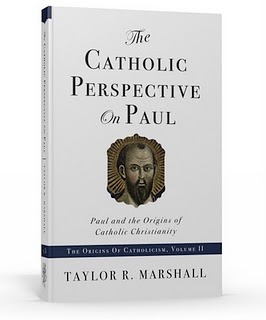 The wait is over for book two in Taylor Marshall‘s three-volume Origins of Catholicism series! You may recall my review of book one, The Crucified Rabbi, which focused on the organic links between Judaism and the Catholic Church. Christmas came early for me this year when volume two, The Catholic Perspective on Paul, arrived in my mailbox recently. Since a particular interpretation of Paul’s writings by Luther touched off the Protestant revolution in the first place, it’s crucial to understand Paul correctly to ascertain (to borrow a phrase from N.T. Wright) what Saint Paul really said.
The wait is over for book two in Taylor Marshall‘s three-volume Origins of Catholicism series! You may recall my review of book one, The Crucified Rabbi, which focused on the organic links between Judaism and the Catholic Church. Christmas came early for me this year when volume two, The Catholic Perspective on Paul, arrived in my mailbox recently. Since a particular interpretation of Paul’s writings by Luther touched off the Protestant revolution in the first place, it’s crucial to understand Paul correctly to ascertain (to borrow a phrase from N.T. Wright) what Saint Paul really said.
Look for my full review in Catholic Insight magazine in early 2011, but let me give you a sneak peek at Paul from Taylor’s Perspective:
It has been said that Paul’s entire theology is an expansion upon the particular words of Christ pronounced to him on the road to Damascus: “Saul, Saul, why do you persecute me?” (Acts 26:14). With these words, Christ revealed that to persecute any of His disciples is to persecute Him. When Saul approved of the murder of Stephen, he had approved of the murder of Christ. When Saul imprisoned Christians, he had imprisoned Christ. From this intimate union between Christ and his disciples, Saint Paul extrapolated his entire theological system. Accordingly, Paul’s doctrine of the believer’s union with the person of Christ is the bedrock of Catholic theology because it presents salvation in terms of participation. Christ’s statement to Saul reveals that the Christian believer participates in the life of Christ. This is the center of Paul’s message. “So we, though many, are one body in Christ, and individually members of one another” (Rom 12:5). The epistles of Paul constantly and consistently resound with the phrase “in Christ” and “in him”. This phrase is more common than any other topic in the letters of Paul combined. This means that Paul discusses the believer’s participation in Christ more than justification, faith, works, law, or predestination. Union with Christ is the ubiquitous theme of Paul’s theology.
When we understand Christianity as a participation in Christ, we begin to read Paul’s epistles in a new light, or rather under the ancient light of the Church Fathers who lived before us. We find that the “old perspective on Paul” articulated by the Catholic Church had it correct all along. Saint Paul presents the Church, baptism, the Eucharist, marriage, faith, works, justification, sanctification, and regeneration as participations in the person and work of Christ…this interpretation confirms that Paul’s teachings are in fact the teachings of the Catholic Church.
Paul’s paradigm of “union with Christ” can be contrasted with what I call “zero-sum theology”. Let me boldly suggest that all theological misunderstandings regarding the Catholic faith can be attributed to the adoption of “zero-sum theology”. By “zero-sum theology”, I mean that theological framework that views salvation, grace, life, and love as a pie with only so many pieces. Christ either gets all pieces or loses the remaining pieces to Mary, saints, sacraments, priests, popes, etc. Naturally, Christ as God should receive all the pieces – not merely some of the pieces. He is the whole of salvation, right?
Of course, Christ is the whole. He is “all in all” as Saint Paul beautifully teaches (Eph 1:23). However, Catholics do not subscribe to a “zero-sum” approach to Christ. Rather than using a “zero-sum” model, Catholics use Saint Paul’s paradigm of participation. Christ is “all in all”, but this means that all other aspects of redemption participate in and through Christ – not apart from Christ. Catholics thus believe that the sacraments, Mary, saints, and priests participate in and through Christ, and thereby lead the Christian to embrace Christ more deeply.
This difference between Catholicism and Protestantism accounts for almost every doctrinal difference between Catholic theology and Protestant theology. Catholicism is framed by a doctrine of participation – Protestantism is generally framed by the zero-sum paradigm.
– Taylor Marshall, The Catholic Perspective on Paul, pp. 26-28



As a cradle Catholic, and fairly well informed in my Catholic Faith, I previously felt the best apologetic argument for the Catholic Church was the issue of “authority.” This article brings a new way for me to objectively explain the case of “The Church” as subsisting in the present “Roman Catholic Church.” Thanks for the annotation on the book; sounds like another “must have” for me.
Good post.I learn something new and challenging on blogs I
stumbleupon everyday. It’s always useful to read through content from other authors and use
somethihg from their web sites.
Here is my web site: bbw personals – sos.siena.edu,